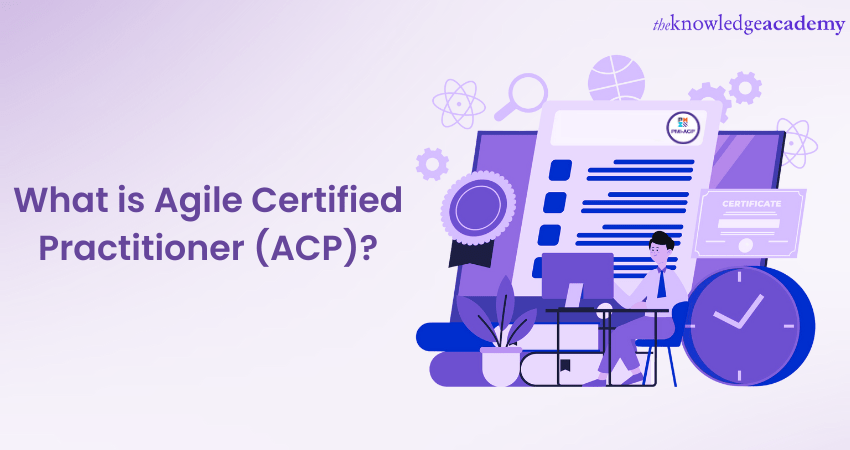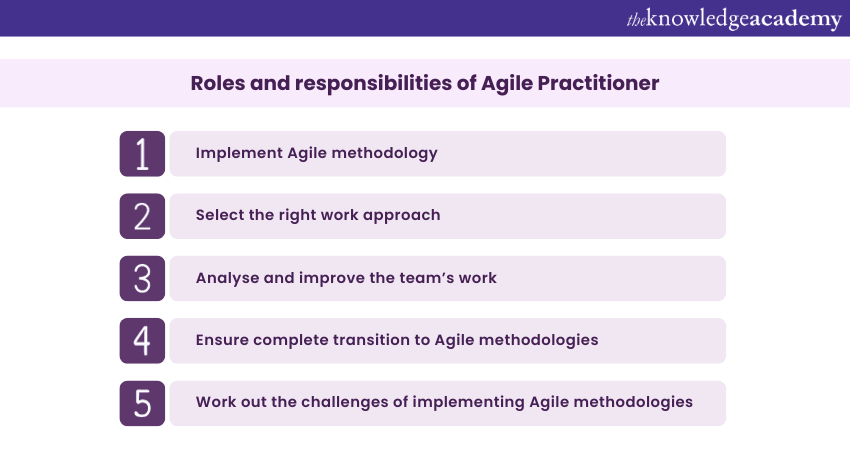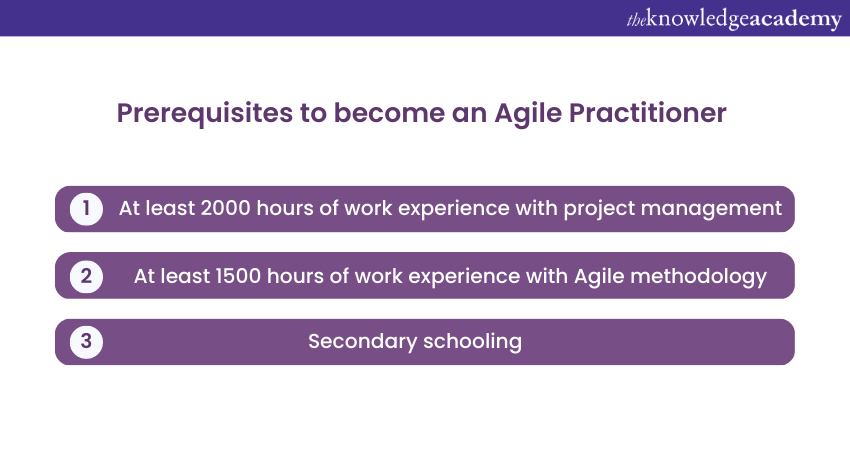We may not have the course you’re looking for. If you enquire or give us a call on 44 1344 203 999 and speak to our training experts, we may still be able to help with your training requirements.
Training Outcomes Within Your Budget!
We ensure quality, budget-alignment, and timely delivery by our expert instructors.

Projects are an organisation's heart and soul, and using the right Project Management approach is critical for its success. Many companies struggle to adapt to new changes. An Agile Certified Practitioner (ACP) can help your organisation transition quickly to Agile methodologies. An Agile Certified Practitioner's primary purpose is to ensure that their organisation completely transitions to and adopts Agile methodologies.
According to PMI, the companies that are Agile and adjust quickly to changes are 75 per cent more efficient than those that don't. So, transitioning to Agile methodologies can improve your organisation's performance. In this blog, you will learn who Agile Practitioners are, their roles and responsibilities and how to become a PMI Agile Certified Practitioner. Read the blog to understand what is an Agile Certified Practitioner.
Table of Contents
1) What is an Agile Practitioner?
2) Who is an Agile Certified Practitioner?
3) How to become an Agile Certified Practitioner?
4) What is PMI-ACP Certification?
5) Benefits of PMI-ACP Certification
6) Conclusion
Who is an Agile Certified Practitioner?
Agile Certified Practitioners are people who have a high level of proficiency in Agile methodologies. Like their name, they are Agile in adopting new techniques and processes. They can quickly adapt to new changes. They typically use the techniques and principles specified in the Agile manifesto. Plus, they possess profound knowledge of the following frameworks:
a) Extreme Programming
b) Lean
c) Kanban
d) Test-Driven Development
e) Scrum
An Agile certification helps accumulate diverse skill sets that an Agile Certified Practitioner can implement on various demanding projects. The primary goal of Agile is not to follow one approach for the entire project but to choose one that best suits the needs. So that's where learning multiple approaches comes in handy.
Roles and responsibilities of Agile Practitioner

In this section, you will learn ACPs' roles and responsibilities. Agile Practitioners help their team use the best Agile methodologies and help implement Agile methodology throughout the organisation. They play a crucial role in helping decide which Agile processes to use in their organisation. Moreover, they also examine their team's current work approach and find out where they can improve.
An Agile Practitioner's primary purpose is to ensure that their organisation completely transitions to and adopts Agile Methodologies. They also examine the challenges of implementing the framework and its benefits.
Agile Practitioner stays calm and composed even under challenging circumstances and always looks for ways to improve their work. Most importantly, they are not egotistical and welcome fair and constructive criticism, so they can efficiently work with any team. Hence, they are perfectly capable of handling unexpected and challenging situations.
Signup for our course on Agile Project Management Practitioner (AgilePM®) and learn how to implement Agile methodology on your projects
How to become an Agile Certified Practitioner?
An Agile Practitioner should understand all the subjects of Agile Project Management and constantly monitor the latest trends. Moreover, they should be open to new techniques and willing to learn new things.
If you want Agile certification, you can take an online course. Many training courses are available, and you just need to choose one that PMI accredits. Once you have done that, you must prepare and pass the PMI ACP examination. Before applying for the exam, you need to ensure you possess all the relevant qualifications.
Prerequisites to become an Agile Practitioner

In this section, you will learn the basic requirements to become an Agile Practitioner. So, if you want to become a Certified Practitioner, ensure you have at least 2000 hours of work experience with project teams in the last five years. In the last three years, you must also have Agile project experience of at least 1500 hours of work with Agile methodologies or Agile project teams. In terms of educational qualifications, you must have completed secondary School or other equivalent qualifications.
Elevate your Agile interview game! Discover challenging Agile Interview Questions designed to showcase your skills and expertise.
What is PMI-ACP certification?
The Project Management Institute (PMI) offers the PMI-ACP (Agile Certified Practitioner) certification, which holds global recognition and acceptance. This certification encompasses various Agile principles, tools, and methodologies, including Kanban, Scrum, Lean, Extreme Programming (XP), and Test-Driven Development (TDD). The PMI-Agile Certified Practitioner certification equips Agile Practitioners with a diverse skill set, enabling them to apply their expertise across different projects.
Agile methodology focuses on delivering the product in smaller, incremental sprints rather than making customers wait until the entire project is complete. Customer satisfaction is paramount in Agile, with initial prototypes shared to gather early feedback. This iterative process allows corrections and ensures that the final product meets customer expectations. By involving customers early on, they gain visibility into the product's appearance and receive prioritised deliverables, such as the Minimum Viable Product, leading to increased satisfaction.
Signup for our course on Certified Professional in Agile Project Management (CPAPM) and learn how to implement Agile methodology on your projects
Benefits of PMI-ACP Certification
Acquiring a PMI-Agile Certified Practitioner certification comes with various advantages. One notable benefit is the high demand for agile professionals, reflecting the prevalent use of Agile methods in organisations. This certification positions candidates as effective and trained Agile Practitioners, allowing them to stand out in a competitive job market.
Moreover, the PMI-ACP certification is globally recognised, enabling Certified individuals to apply their skills across different industries and organisations worldwide. Beyond enhancing career prospects, the certification validates one's knowledge and professionalism in Agile practices, tools, techniques, and methodologies, contributing to overall professional growth. Additionally, a PMI-ACP certificate is associated with better salary prospects, with Certified professionals often earning higher salaries than their non-certified counterparts.
PMI Agile Certified Practitioner salary and jobs
Professionals with Agile Certified Practitioner certification can choose from various job roles, such as PMP Scrum Master, Project Manager, Agile Trainer, Technical Business Analyst, Deputy Project Manager, Business Analyst, Agile Project Manager, and Digital Channel Planner. It's important to note that salary structures may vary across different countries.
Exploring Salary Structures by Job Roles
Let's examine the salary expectations of various job roles in multiple countries.
|
Job role |
Salary (GBP) |
|
Project Manager |
£45,000 - £66,000 |
|
Senior Project Manager |
£45,000 - £66,000 |
|
Agile Coach |
£66,000 - £100,000 |
|
Scrum Master |
£56,000 - £81,000 |
|
Software Developer |
£49,000 - £80,000 |
|
Certified ScrumMaster (CSM) |
£57,000 - £97,000 |
|
Technical Project Manager |
£66,000 - £107,000 |
|
Business Analyst |
£44,000 - £50,000 |
|
Agile Project Manager |
£45,000 - £66,000 |
Source: Glassdoor
Conclusion
We hope you understand What an Agile Certified Practitioner is and how to become one by reading this blog. You would have also learned the skills and tools necessary to become a successful ACP. Moreover, you would also have learned some practical tips on how to build your business and get clients.
Signup for our course on Agile Project Management Foundation (AgilePM®) and acquire the fundamental skills on Agile methodologies.
Frequently Asked Questions

In Agile, the 3 C's—Card, Conversation, and Confirmation—are key principles. "Card" represents a task or user story with essential details. "Conversation" encourages open communication for clarity and shared understanding. "Confirmation" sets criteria for task completion, ensuring alignment between the team and stakeholders. Embracing these principles fosters effective collaboration and successful Agile development.

Agile operates across four pivotal levels within an organisation. It begins at the individual level, instilling a mindset of collaboration and adaptability among team members. Progressing to the team level, Agile encourages collaborative efforts through practices like Scrum or Kanban. The program level involves coordinating multiple teams with frameworks like SAFe to align efforts toward common goals. At the portfolio level, Agile takes a strategic approach, aligning and prioritising work across the organisation through Agile portfolio management, creating a cohesive and adaptable organisational strategy.

The distinction between an Agile Practitioner and a Scrum Master lies in their scope and focus within the Agile framework. An Agile Practitioner is a professional well-versed in the broader principles of Agile methodologies, applying them to improve processes and collaboration across various Agile approaches.
On the other hand, a Scrum Master is a dedicated role within the Scrum framework, specifically focused on supporting and facilitating the Scrum process. Their responsibilities include ensuring adherence to Scrum practices, removing impediments, and fostering continuous improvement within the Scrum team. In essence, while an Agile Practitioner encompasses a wider range of Agile methodologies, a Scrum Master is a specialist concentrating on the intricacies of the Scrum Framework.

The Knowledge Academy takes global learning to new heights, offering over 30,000 online courses across 490+ locations in 220 countries. This expansive reach ensures accessibility and convenience for learners worldwide.
Alongside our diverse Online Course Catalogue, encompassing 17 major categories, we go the extra mile by providing a plethora of free educational Online Resources like News updates, blogs, videos, webinars, and interview questions. Tailoring learning experiences further, professionals can maximise value with customisable Course Bundles of TKA.
The Knowledge Academy’s Knowledge Pass, a prepaid voucher, adds another layer of flexibility, allowing course bookings over a 12-month period. Join us on a journey where education knows no bounds.

Explore Agile Courses with The Knowledge Academy, where more courses await, including Agile for Teams, Agile Overview, and Agile Change Agent. Tailored for various skill levels, these courses offer in-depth insights into Agile methodologies.
Dive into our Project Management blogs, a trove of resources covering Agile topics. Whether you are a beginner or aiming to enhance your Project Management skills, The Knowledge Academy's diverse courses and insightful blogs are your go-to source.
Upcoming Project Management Resources Batches & Dates
Date
 PMI-ACP® Certification Training
PMI-ACP® Certification Training
Mon 6th Jan 2025
Mon 19th May 2025
Mon 22nd Sep 2025
Mon 1st Dec 2025







 Top Rated Course
Top Rated Course



 If you wish to make any changes to your course, please
If you wish to make any changes to your course, please


